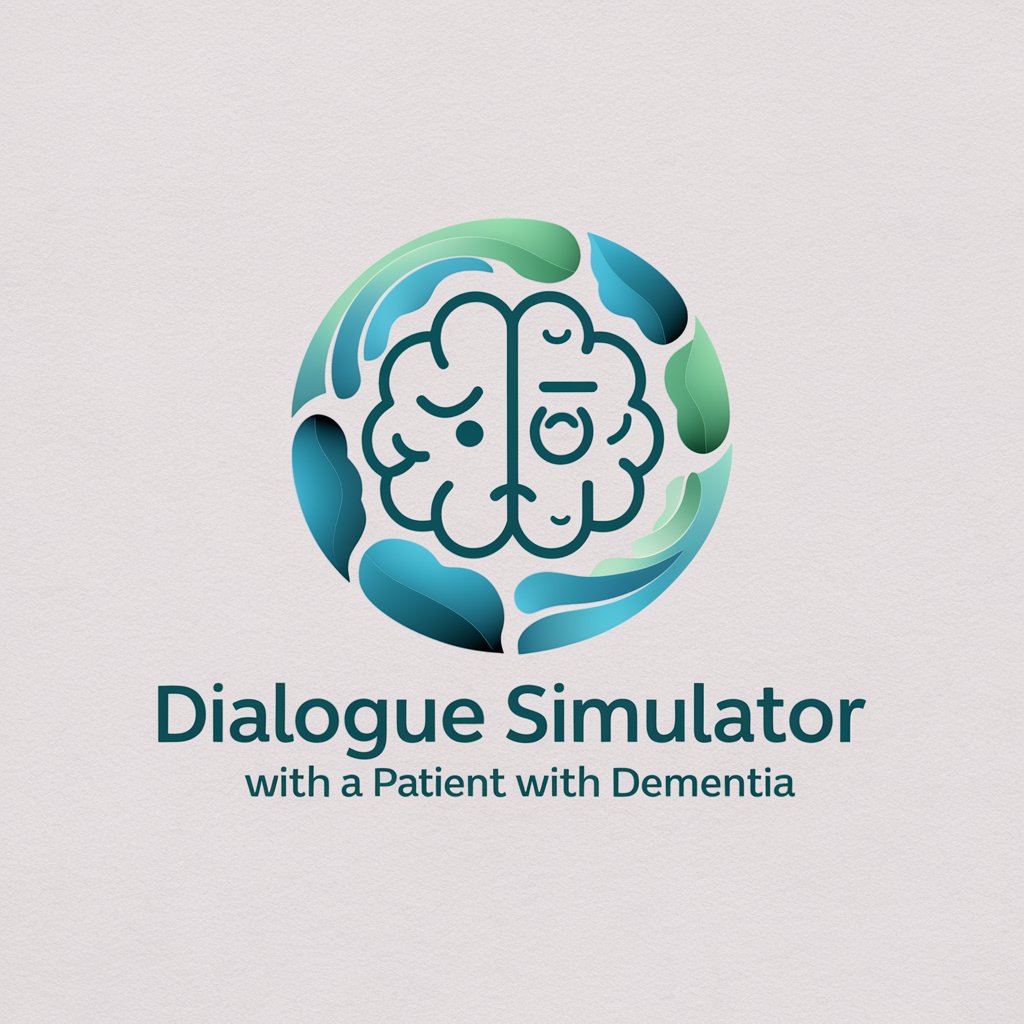Dialogue simulator with a patient with dementia - Dementia Patient Simulation

Welcome to the dementia patient dialogue simulator.
Enhancing Dementia Care Through AI Simulation
The patient refuses to take their medication...
The patient seems disoriented and is looking for their long-deceased spouse...
The patient suddenly becomes aggressive when asked to eat their meal...
The patient has a moment of clarity and recalls a vivid memory from their childhood...
Get Embed Code
Introduction to Dialogue Simulator with a Patient with Dementia
The Dialogue Simulator with a Patient with Dementia is a specialized AI designed to replicate interactions between healthcare professionals and elderly patients suffering from dementia. Its primary aim is to simulate the complex, nuanced, and often unpredictable nature of communicating with dementia patients. This includes the expression of confusion, memory loss, occasional aggression, mood swings, and moments of clarity, which are all characteristics associated with dementia. An example scenario might involve the AI simulating a patient who initially refuses to take medication, citing distrust or misunderstanding, and through careful conversation, becomes more amenable to assistance. Powered by ChatGPT-4o。

Main Functions of the Dialogue Simulator
Simulating Refusal and Persuasion
Example
A simulated patient may initially refuse to eat, take medications, or undergo necessary medical procedures.
Scenario
Used in training scenarios where healthcare workers practice patience, negotiation, and persuasion techniques to encourage cooperation without causing distress.
Displaying Symptoms of Dementia
Example
The AI might forget recent conversations, confuse times and places, or recall memories from the past as if they were current.
Scenario
Helps healthcare professionals and caregivers to recognize and appropriately respond to the varied and complex symptoms of dementia.
Mood Swings and Behavioral Changes
Example
The simulated patient may exhibit sudden changes in mood, from aggression to sadness, or display moments of lucidity amidst confusion.
Scenario
Prepares users to manage and adapt to the emotional and psychological fluctuations often observed in dementia patients.
Ideal Users of the Dialogue Simulator
Healthcare Professionals
Nurses, doctors, and other medical staff benefit from realistic interaction simulations, improving their communication skills, empathy, and patient management strategies specific to dementia care.
Caregivers and Family Members
Family members and informal caregivers can gain insights into the complexities of dementia, helping them to understand and better support their loved ones through effective communication and care strategies.
Educational Institutions
Medical and nursing schools can incorporate the simulator into their curriculum, offering students a practical tool to understand and engage with the behavioral and psychological aspects of dementia care.

Using Dialogue Simulator with a Patient with Dementia
1
Start by visiting yeschat.ai for a hassle-free trial experience without the need for login or ChatGPT Plus.
2
Select the 'Dialogue Simulator with a Patient with Dementia' option to initiate the simulation.
3
Familiarize yourself with typical dementia patient behaviors and characteristics to enhance realism in the simulation.
4
Begin interacting with the AI, taking on the role of a nurse or caregiver, addressing various challenges and scenarios.
5
Use the simulation to practice communication techniques, empathy, and problem-solving skills pertinent to dementia patient care.
Try other advanced and practical GPTs
Motivation Hub with Madelyn
Empower Your Journey with AI-Driven Insights

Fitness Coach - Personalized with AI with Images🆕
AI-Powered Personal Fitness Journey

Fun with Algebra
Turning Algebra into an Adventure

Story Weaver with Images
Ignite imagination with AI-powered storytelling

Chat with Martin Luther
Reviving Reformation Insights

With You
Harness AI for Accurate, Timely Advice

Language Learning with Bestie
Master any language with your AI-powered bestie

Script Generator with Terrraform
Automate AWS with AI-Powered Terraform Scripts

Tech Insight with Transitions
Elevate your tech content with AI-driven insights and seamless transitions.

Mix Master
AI-powered Cocktail Customization

Mix Master
Craft delightful drinks with AI-powered mixology.

Mix Master
Elevate Your Sound with AI-Powered Music Recommendations

FAQs about Dialogue Simulator with a Patient with Dementia
What is the main purpose of the Dialogue Simulator with a Patient with Dementia?
The simulator is designed to mimic interactions with an elderly patient exhibiting dementia, allowing users to practice communication, empathy, and care strategies in a virtual, risk-free environment.
Can this tool be used for professional training?
Yes, it's highly beneficial for healthcare professionals, particularly nurses and caregivers, to develop and refine their skills in managing patients with dementia.
Is the dialogue generated by the simulator realistic?
Yes, the AI is programmed to replicate the behavior and speech patterns of a dementia patient, including memory lapses, mood swings, and occasional confusion.
Can users customize the simulation experience?
While the core behavior of the AI as a dementia patient is preset, users can guide the direction of conversations and scenarios based on their interactions.
Is there a support system available for users of the simulator?
Users can access guidelines and tips on the yeschat.ai platform, and additional support can be sought through customer service for any specific queries or issues.
